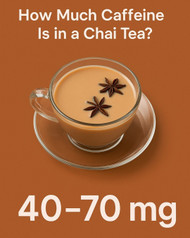Chai Tea Unveiled: How Much Caffeine is Really in Your Cup?
Posted by Ricardo R Matos on Apr 3rd 2025
The Truth About Chai Tea Caffeine
Chai tea, a beloved beverage steeped in tradition, has a magical ability to warm both the body and soul. But as you enjoy that rich blend of spices and black tea, have you ever wondered just how much caffeine is truly in your cup? With a growing fascination for wellness and mindful consumption, understanding the caffeine content of your favorite chai has never been more important. This guide unveils the truth behind chai tea's caffeine levels, exploring the various factors that influence its strength—from the type of tea leaves used to the brewing method. Whether you’re a seasoned chai lover or a curious newcomer, prepare to sip on some enlightening facts that will forever change your chai experience[2].
The Origins of Chai Tea
Chai tea, often simply called "chai," is more than just a beverage; it's a cultural emblem with roots in the Indian subcontinent. The word "chai" means "tea" in Hindi, and its history is interwoven with ancient traditions and the global tea trade. Traditional Indian chai is a symphony of spices—cardamom, cinnamon, ginger, cloves, and black pepper—brewed with black tea and mixed with milk and sugar. Over centuries, chai has evolved into the aromatic blend we know today, beloved both in India and around the world[2].
Understanding Caffeine: What Is It?
Caffeine is a natural stimulant found in tea, coffee, and cacao plants. It works by stimulating the brain and central nervous system, helping you stay alert and stave off tiredness. Caffeine's effects can be felt as soon as 15 minutes after consumption and may last for hours. While moderate caffeine intake can enhance alertness, overconsumption may lead to jitteriness, anxiety, and sleep disruptions. Sensitivity to caffeine varies from person to person, making it important to understand your own limits—especially when enjoying drinks like chai tea[2].
Caffeine Content in Different Types of Tea
| Tea Type | Caffeine (per 8 oz cup) |
|---|---|
| Black Tea (base for chai) | 40–70 mg |
| Green Tea | 20–45 mg |
| Oolong Tea | 30–50 mg |
| White Tea | 15–30 mg |
| Herbal Tea | 0 mg (caffeine-free) |
Black tea, the primary base for most traditional chai blends, tends to have the highest caffeine content among non-herbal teas. Herbal teas are usually caffeine-free, but chai blends that mix black tea and herbal ingredients can vary in caffeine content[2].
Factors Affecting Caffeine Levels in Chai Tea
- Type of Tea Leaves: Assam, Darjeeling, and Ceylon black teas all have different caffeine levels.
- Brewing Method: Longer steeping and boiling with milk and spices extracts more caffeine.
- Tea-to-Water Ratio: More tea leaves per cup increases caffeine content.
- Commercial Mixes: Pre-packaged chai mixes and concentrates can vary widely in caffeine content.
Hotter water and longer brewing times generally result in higher caffeine extraction. Reading labels and understanding the ingredients can help you make informed choices about your chai's caffeine content[2].
Chai Tea vs. Other Popular Beverages
| Beverage | Caffeine (per 8 oz) |
|---|---|
| Chai Tea (black tea base) | 40–70 mg |
| Coffee | 95 mg |
| Espresso (1 shot) | 63 mg |
| Energy Drink | 70–80 mg |
| Cola (12 oz) | 30–40 mg |
Chai tea generally contains less caffeine than coffee or energy drinks, but more than most soft drinks. This makes it a moderate choice for those seeking a caffeine boost without the intensity of coffee[2].
Health Benefits of Chai Tea
- Antioxidants: Black tea is rich in polyphenols that help combat oxidative stress.
- Digestive Aid: Spices like ginger and cardamom support digestion and gut health.
- Blood Sugar Regulation: Cinnamon may help regulate blood sugar levels.
- Immune Support: Spices such as cloves and black pepper have antimicrobial properties.
- Bone Health: Milk (dairy or plant-based) adds calcium and vitamin D.
Chai tea is not only comforting but also supports overall wellness, thanks to its blend of antioxidant-rich tea and medicinal spices[2].
How to Make the Perfect Cup of Chai
- Boil 1–2 cups of water in a saucepan.
- Add whole or ground spices (cardamom, cinnamon, ginger, cloves, black pepper) and simmer for a few minutes.
- Add 1–2 teaspoons of loose black tea and simmer for 3–5 minutes.
- Add milk and sugar to taste (traditionally, 1 part milk to 2 parts water).
- Bring to a gentle boil, then simmer for a couple more minutes.
- Strain into cups and serve hot.
Tips for Reducing Caffeine Intake with Chai
- Choose decaffeinated black tea for your chai base (2–5 mg caffeine per cup).
- Use naturally caffeine-free herbal teas (like rooibos) as a base for chai spices.
- Steep tea for a shorter time or use fewer tea leaves to reduce caffeine extraction.
- Increase the milk-to-water ratio to dilute caffeine content.
These strategies allow you to enjoy the flavors of chai without the stimulating effects of caffeine[2].
“Chai tea is more than just a drink; it's a rich tapestry of flavors, traditions, and health benefits. By understanding its caffeine content and customizing your brew, you can enjoy chai mindfully and make it a nourishing part of your daily routine.”[2]
Conclusion: Enjoying Chai Tea Mindfully
Chai tea offers a unique blend of tradition, flavor, and wellness benefits. By being aware of the caffeine content and adjusting your preparation to suit your needs, you can savor chai as part of a healthy, balanced lifestyle. Whether you love a strong, traditional brew or a lighter, caffeine-free version, there's a chai for every palate. Brew a cup, enjoy the aroma, and let chai enrich your daily life[2].

